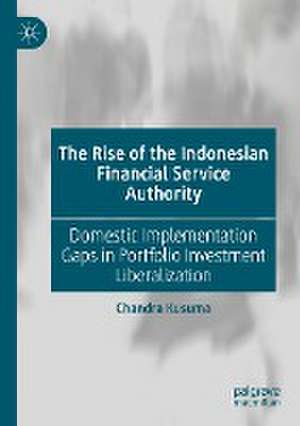The Rise of the Indonesian Financial Service Authority: Domestic Implementation Gaps in Portfolio Investment Liberalization
Autor Chandra Kusumaen Limba Engleză Paperback – 19 aug 2023
The book reveals that the endowment of an ‘independent and free’ status, as well as the FSA’s power over the Indonesian financial sector, has allowed agents in the FSA to provide different positions or responses to the already agreed ASEAN financial liberalization initiatives. Contrary to the expectations of most writers that the independent status of an institution would advance financial liberalization, this book shows that the ‘independent and free’ status of the Indonesian FSA has actually stymied financial liberalization. To achieve this, thebook employs a modified account of the historical institutionalism approach, or ‘the agents-in-context’ approach, examining how and why the Indonesian FSA has emerged as an independent authority. The insights drawn from applying a modified historical institutionalism approach to the case study of Indonesian portfolio investment liberalization critiques and complements existing works in the regionalism literature in general, and ASEAN financial integration particularly.
| Toate formatele și edițiile | Preț | Express |
|---|---|---|
| Paperback (1) | 776.09 lei 6-8 săpt. | |
| Springer Nature Singapore – 19 aug 2023 | 776.09 lei 6-8 săpt. | |
| Hardback (1) | 780.37 lei 6-8 săpt. | |
| Springer Nature Singapore – 18 aug 2022 | 780.37 lei 6-8 săpt. |
Preț: 776.09 lei
Preț vechi: 946.45 lei
-18% Nou
Puncte Express: 1164
Preț estimativ în valută:
148.55€ • 161.41$ • 124.86£
148.55€ • 161.41$ • 124.86£
Carte tipărită la comandă
Livrare economică 19 aprilie-03 mai
Preluare comenzi: 021 569.72.76
Specificații
ISBN-13: 9789811938528
ISBN-10: 9811938520
Pagini: 186
Ilustrații: XV, 186 p. 12 illus., 10 illus. in color.
Dimensiuni: 148 x 210 mm
Greutate: 0.27 kg
Ediția:1st ed. 2022
Editura: Springer Nature Singapore
Colecția Palgrave Macmillan
Locul publicării:Singapore, Singapore
ISBN-10: 9811938520
Pagini: 186
Ilustrații: XV, 186 p. 12 illus., 10 illus. in color.
Dimensiuni: 148 x 210 mm
Greutate: 0.27 kg
Ediția:1st ed. 2022
Editura: Springer Nature Singapore
Colecția Palgrave Macmillan
Locul publicării:Singapore, Singapore
Cuprins
Chapter 1: Introduction.- Chapter 2: Modified Historical Institutionalism.- Chapter 3: The Emergence of the Indonesian FSA.- Chapter 4: The Indonesian FSA and Stymied Portfolio Investments Liberalizaton.- Chapter 5: Emerging Challenges to Domestic Implementation of Portfolio Investments Liberalization.- Chapter 6: Conclusion.
Notă biografică
Chandra Kusuma is a senior official for the government at the Fiscal Policy Agency of the Ministry of Finance of the Republic of Indonesia (MOF), serving the Ministry since 2004. He is also a Sessional Lecturer at the Indonesian State College of Accountancy (PKN-STAN) teaching courses on Banks and Financial Institutions, as well as Macroeconomics. He holds a Ph.D. in International Political Economy from the University of Queensland, Australia.
Textul de pe ultima copertă
This book focuses on the Indonesian Financial Service Authority (FSA), which is a newly established authority within Indonesian financial services institutions that has emerged as the ultimate decision-maker for portfolio investment liberalization. In doing so, the book elaborates on how the emergence of the Indonesian FSA has resulted in implementation gaps in Indonesia, in the area of portfolio investment liberalization.
The book reveals that the endowment of an ‘independent and free’ status, as well as the FSA’s power over the Indonesian financial sector, has allowed agents in the FSA to provide different positions or responses to the already agreed ASEAN financial liberalization initiatives. Contrary to the expectations of most writers that the independent status of an institution would advance financial liberalization, this book shows that the ‘independent and free’ status of the Indonesian FSA has actually stymied financial liberalization. To achieve this,the book employs a modified account of the historical institutionalism approach, or ‘the agents-in-context’ approach, examining how and why the Indonesian FSA has emerged as an independent authority. The insights drawn from applying a modified historical institutionalism approach to the case study of Indonesian portfolio investment liberalization critiques and complements existing works in the regionalism literature in general, and ASEAN financial integration particularly.
Chandra Kusuma is a senior official for the government at the Fiscal Policy Agency of the Ministry of Finance of the Republic of Indonesia (MOF), serving the Ministry since 2004. He is also a Sessional Lecturer at the Indonesian State College of Accountancy (PKN-STAN) teaching courses on Banks and Financial Institutions, as well as Macroeconomics. He holds a Ph.D. in International Political Economy from the University of Queensland, Australia.
The book reveals that the endowment of an ‘independent and free’ status, as well as the FSA’s power over the Indonesian financial sector, has allowed agents in the FSA to provide different positions or responses to the already agreed ASEAN financial liberalization initiatives. Contrary to the expectations of most writers that the independent status of an institution would advance financial liberalization, this book shows that the ‘independent and free’ status of the Indonesian FSA has actually stymied financial liberalization. To achieve this,the book employs a modified account of the historical institutionalism approach, or ‘the agents-in-context’ approach, examining how and why the Indonesian FSA has emerged as an independent authority. The insights drawn from applying a modified historical institutionalism approach to the case study of Indonesian portfolio investment liberalization critiques and complements existing works in the regionalism literature in general, and ASEAN financial integration particularly.
Chandra Kusuma is a senior official for the government at the Fiscal Policy Agency of the Ministry of Finance of the Republic of Indonesia (MOF), serving the Ministry since 2004. He is also a Sessional Lecturer at the Indonesian State College of Accountancy (PKN-STAN) teaching courses on Banks and Financial Institutions, as well as Macroeconomics. He holds a Ph.D. in International Political Economy from the University of Queensland, Australia.
Caracteristici
Argues that the emergence of the Indonesian FSA has resulted in domestic implementation gaps Highlights how the ‘independent and free’ status of the Indonesian FSA has stymied financial liberalization Critiques and complements existing works in the regionalism literature
